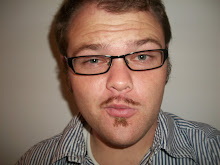I've also been working to find Lacerda's other books. Turns out there are a lot more than I had previously imagined. I knew there were four for sure, and I had found a few others in library catalogs, but according to my newest sources there are at least ten collections of poetry, and that's not counting collected-work anthologies or his prose. I know a few are out of print and some others are all but gone, but I think I can get my hands on a few of them.
That's a lot of writing for not having a picture. Here:
Francisco Sá Carneiro Square
Who is Francisco Sá Carneiro, you ask? Well, apparently he founded the Social Democratic Party in Portugal in 1974 (which, interestingly, was also the year of the Portuguese Carnation Revolution...whatever that means). He was elected Prime Minister of Portugal but after less than a year he died in a plane crash. Conspiracy theories abound. All I can really say is that my favorite part is the floating head in front of the workmen statue.
The same day I took this picture I walked down the picturesque Avenida Gago Coutinho (say that five times fast). Here's proof that it's picturesque:
Anyways, the other thing that I've been doing is learning continental Portuguese. Let me tell you, it's an adventure. Throw in the facts that a good chunk of my new-found friends are Brazilians and the people I live with are from Cabo Verde (see previous post) and I've got all sorts of dialects bouncing around in my head.
For those of you who don't know, I learned Portuguese as a missionary in Goiás, Brazil. I was there for two years exactly (July 14, 2004 - July 14, 2006), during which time I had contact with blue-eyed English-speaking people for all of 21 weeks (out of 104). In case you were wondering...
Goiás is here:
and it looks like this:
Seriously.
I could (and just might) fill books with head-sized-spider-finding, cockroach-hockey-playing, dengue-fever-getting Brazil stories, but I digress. Let's talk about language.
My personal verdict is that continental Portuguese is prettier and more formal than Brazilian Portuguese, but it is also much harder to understand, much like the difference between Spanish Spanish and Spanish in the Americas. Here, s = sh, they stop saying a word about one third of the way through it. Plus, they don't speak as loud (they're much more introverted). But all in all I enjoy it, even when I'm a little lost, and my language skills are on the up and up (for example, I remembered the word for onion the other day). (It's cebola.)
Instead of telling you all the vocabulary that is different, I'm going to make you a non-comprehensive list of words that are different in Portugal than they are in Brazil. You're on your own for pronunciation. Here goes nothing:
English Brazilian Continental Portuguese
Cell phone Cellular Telemóvel
Refrigerator Gelador Frigorífico
Fire Fogo Lume
Bus Ônibus Autocarro
Ok, ok, it's not like I'm learning Chinese (go Sophie!), but when you've learned a vocabulary word and used it full-time for two years and part-time for five, change comes slow. But the look on people's faces when they figure out that I speak their language is still priceless. Even if they have no idea where I put the leftovers.







1 comments:
This post makes me want to go to Spain and learn "real" Spanish. :)
Keep living la vida loca! ;)
Post a Comment